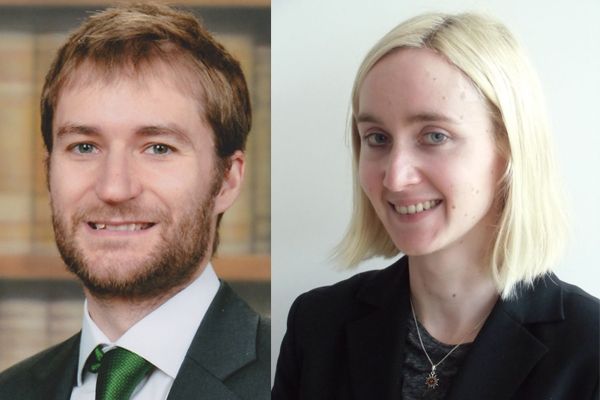
(Vienna, 29 September 2017) Robin Ristl and Susanne Urach from the Institute of Medical Statistics of the Center for Medical Statistics, Informatics and Intelligent Systems (CeMSIIS) were awarded the Arthur Linder Prize of the Austrian-Swiss Region (ROeS) of the International Biometric Society (IBS) for their work "Optimal exact tests for multiple binary endpoints" and "Multi-arm group sequential designs with a simultaneous stopping rule".
The Arthur Linder Prize is sponsored by the International Biometric Society of the Austrian-Swiss Region and is awarded to young scientists. In honour of Arthur Linder, this prize is awarded every two years for research work in the field of biometrics. Robin Ristl and Susanne Urach from the Medical University of Vienna were awarded prizes at the Joint Conference on Biometrics & Biopharmaceutical Statistics (CEN-ISBS) 2017. Heidi Seibold from the University of Zurich received another prize.
Robin Ristl and Susanne Urach developed innovative statistical analysis methods for clinical trials. The research work resulted in the scope of the EU-FP7 project ASTERIX (“Advances in Small Trials dEsign for Regulatory Innovation and eXcellence”).
In the award-winning article "Multi-arm Group Sequential Designs with a Simultaneous Stopping Rule" in Statistics in Medicine (Urach, S., and Posch, M. (2016)), statistical test procedures for multi-arm therapy studies with intermediate analyses were investigated. An important factor is the stop rules, which specify the conditions under which a study can already be stopped in an interim analysis. Test procedures have been developed in the scope of the study which are optimised for the selected stop rule. A novel, more efficient test procedure has been developed especially for the so-called "simultaneous stop rule", for which a study is completed in an interim analysis, if a treatment effect can be demonstrated for at least one of the trial arms. Without increasing the number of cases, this achieves a higher statistical power than conventional methods.
Robin Ristl, together with co-authors Xi Dong, Ekkehard Glimm and Martin Posch, developed statistical tests to compare two treatments using multiple binary endpoints. These are used in medical studies where the effectiveness of an experimental treatment is measured by several binary success criteria. The procedures described in the award-winning paper "Optimal exact tests for multiple binary endpoints" meet various optimisation criteria to maximise the likelihood of demonstrating a treatment effect. At the same time, it ensures that the probability of false positive results does not exceed a specified value. These test methods are calculated using numerical optimisation methods. Especially for studies with a small number of cases, such as those used in the research of therapies for rare diseases, the resulting "optimal exact tests" represent a clear progress compared to existing methods.
About Robin Ristl
Robin Ristl studied food technology and biotechnology at the University of Natural Resources and Applied Life Sciences in Vienna and received his PhD in 2012 with a thesis on bacterial protein glycosylation. At the same time he studied statistics at the University of Vienna, where he completed his Bachelor's degree in 2013 and his Master's degree in 2016. He is currently a university assistant at the General Division of the Center for Medical Statistics, Informatics and Intelligent Systems (CeMSIIS) at the MedUni Vienna.
About Susanne Urach
Susanne Urach completed her diploma studies in physics in April 2010, a teaching degree in physics and mathematics in May 2012, and a bachelor's degree in mathematics at the University of Vienna in September 2013. Since November 2013 she has been working as a research associate at the Institute of Medical Statistics (Director: Martin Posch) at the General Division of the Center for Medical Statistics, Informatics and Intelligent Systems (CeMSIIS) of the MedUni Vienna. At the same time, she is a PhD student of the N094 programme with a focus on "Medical Informatics, Biostatistics and Complex Systems" at the MedUni Vienna and is writing her dissertation on "Adaptive Clinical Trials in Small Populations" (Supervisor: Martin Posch).